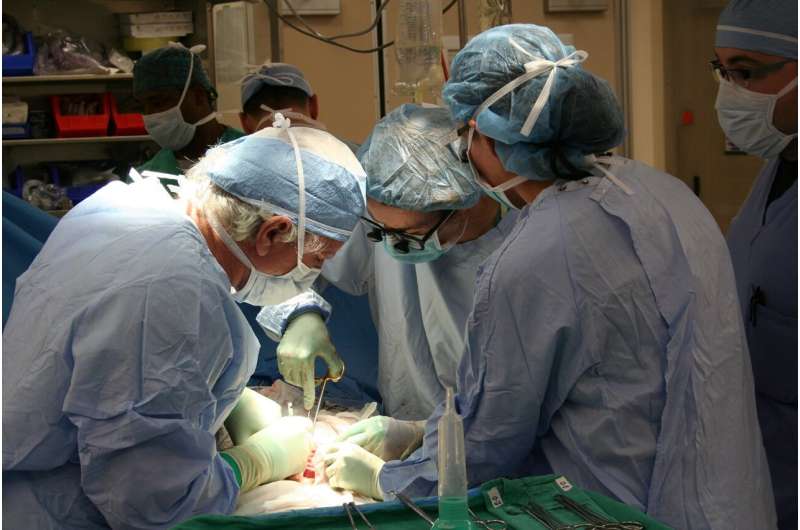This article has been reviewed according to Science X's editorial process and policies. Editors have highlighted the following attributes while ensuring the content's credibility:
fact-checked
peer-reviewed publication
trusted source
proofread
Investigating links between tacrolimus dosage and intestinal microbiota to combat organ transplant rejection

Every year in Belgium, 1,600 people wait for a transplant. Of these, in 2021, only 939 received an organ. Thus more than 40% of patients often have to wait more than a year before hoping to receive a transplant.
When a transplant is possible, it is essential to ensure its success so as not to "waste" an organ. One of the keys to successful transplants is an anti-rejection drug, tacrolimus, which patients must take for life. But it is extremely difficult to dose this drug correctly, which can lead to significant risks of transplant failure in the event of underdosing and significant side effects in the event of overdosing (diabetes, hirsutism, hair loss, neuropathy or nephrotoxic effects).
Profs Laure Bindels and Laure Elens of the University of Louvain (UCLouvain) Louvain Drug Research Institute, supported by Alexandra Degraeve, a UCLouvain FNRS candidate, have been looking into the links between the drug, its dosages, and intestinal microbiota. Their aim has been to determine the factors that influence how the body absorbs and eliminates the drug during transplants. The results of five years of research have been published in Microbiome.
Research using mice
Prof. Bindels began the research using mice, with the goal of determining whether or not the presence of microbiota plays a role in drug absorption. The result was a world first: the UCLouvain researchers observed that without microbiota, tacrolimus levels in the mice's blood were lower. This means that the presence of microbiota increases the drug's concentration in the blood, thereby either reducing the risk of transplant rejection or, conversely, increasing the risk of side effects.
The research also uncovered an as yet unknown mechanism: microbiota promote drug absorption by reducing the action of a protein, P-glycoprotein, which acts like a pump on the surface of intestinal cells and limits the absorption of many drugs, including tacrolimus.
Clinical research
At the same time, in collaboration with Profs Michel Mourad and Vincent Haufroid of the UCLouvain Saint-Luc University Hospital, Prof. Elens carried out clinical tests on fecal matter taken from some 100 patients who had undergone kidney transplants. The goal was to understand the reasons for the wide variability in current tacrolimus dosages (from a factor of one to 30) from one patient to another, by revealing the composition of renal transplant patients' microbiota.
The clinical tests showed that the higher the drug's dosage, the less rich the microbiota (less diverse in bacteria). The research also identified two specific types of bacteria associated with a reduction in the required dosage of tacrolimus. Finally, tests revealed that patients who developed diabetes after taking tacrolimus routinely showed a reduction in a certain type of bacteria (Anaerostipes) in their microbiota, which could indicate the bacteria protects patients from developing diabetes.
What's next?
UCLouvain researchers will now study microbiota over a long period, in order to make comparisons before, just after and at intervals from the transplant, and thus gain an even more accurate picture of the interactions between intestinal bacteria and the absorption of certain drugs, such as tacrolimus. The concept is also being applied to other drugs (anti-HIV, hypotensive drugs, etc.) pumped away by P-glycoprotein.
This discovery also demonstrates the importance of better communication between medical specialties: in the future, if a patient who has undergone a kidney transplant is required to take antibiotics (which have a significant impact on microbiota), it would be useful for contact to be made with their nephrologist beforehand in order to minimize side effects or problems of transplant rejection. Similar considerations apply to major dietary changes.
More information: Laure Bindels et al, Gut microbiome modulates tacrolimus pharmacokinetics through the transcriptional regulation of ABCB1, Microbiome (2023). DOI: 10.1186/s40168-023-01578-y




















